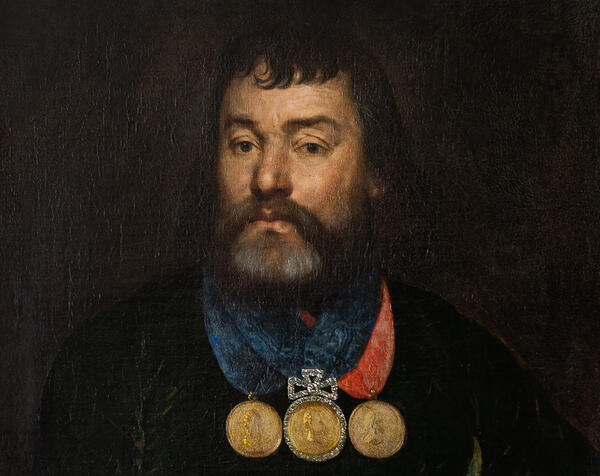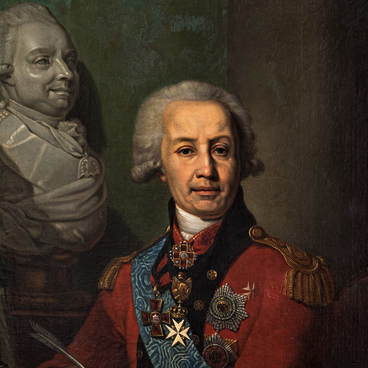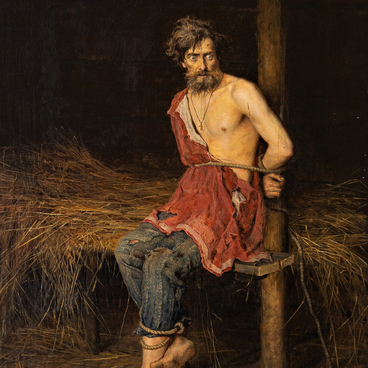The Volsk museum gallery houses a portrait of merchant Vasily Zlobin. This work was created by an unknown provincial artist no earlier than 1801, for the painting shows a merchant with a medal received from Emperor Alexander I.
The picture depicts Zlobin as an energetic, authoritative and wealthy man. He is dressed in a dark-green cloth caftan, firmly clutching the stick in his hand, and on his little finger, there is an expensive ring with a large stone.
Vasily Zlobin was a tax farmer — a merchant who bought the right to some state revenues or taxes for cash. For example, a merchant who bought off the state taxes had the right to collect them himself, adding his own extra charges. According to Russian historian Nikolay Kostomarov, he was ‘a genius man in the field of trade speculation.’
Zlobin was born in the Voskresenskoye village to a family of a court peasant Alexey Polovnik, nicknamed Zlobin, who served as a scribe. The court peasants belonged directly to the imperial family. Vasily himself first worked as an assistant shepherd and later, after the family moved to richer Malykovka, got a position of volost scriber.
In the late 1770s, he favorably married the daughter of a wealthy merchant Volkova, and in 1780 he met the Prosecutor General, Prince Alexander Vyazemsky.
In 1780, by decree of Empress Catherine II, Saratov viceroyalty was established with its center in Saratov. Five villages were transformed into towns. Malykovka became the town of Volgsk, which was later renamed Volsk. In 1781, Zlobin was elected one of the municipal aldermen — members of the town government, and in 1784, he became the town mayor. Under Zlobin, a town council was formed, a census was taken, and the lands belonging to the town were measured. Zlobin did not take part in the elections of 1789.
Zlobin became a tax farmer in 1785. He farmed the wine trade in several provinces, official fisheries in Astrakhan, received purchase taxes from all packs of cards in the empire, delivered food to Moscow and St. Petersburg, as well as salt to 20 provinces of Russia. His net income could be 1000 rubles a day. For example, an average peasant family at the time spent no more than 30 rubles a year.
Having grown rich, Zlobin directed a lot of his efforts towards his hometown. His money was used to build a cathedral, churches, several hospitals, and private stone houses, as well as to plant gardens. Later Vasily Zlobin became an honorary citizen of Volsk.
For almost 20 years, Zlobin’s business was successful, but the complexity of his affairs, unscrupulous agents, as well as his losses from payoffs led him to ruin in 1812. Zlobin’s property was sold at an auction, and he had to move from St. Petersburg to Volsk, where he died in 1814, outliving his son Konstantin by a year.
The picture depicts Zlobin as an energetic, authoritative and wealthy man. He is dressed in a dark-green cloth caftan, firmly clutching the stick in his hand, and on his little finger, there is an expensive ring with a large stone.
Vasily Zlobin was a tax farmer — a merchant who bought the right to some state revenues or taxes for cash. For example, a merchant who bought off the state taxes had the right to collect them himself, adding his own extra charges. According to Russian historian Nikolay Kostomarov, he was ‘a genius man in the field of trade speculation.’
Zlobin was born in the Voskresenskoye village to a family of a court peasant Alexey Polovnik, nicknamed Zlobin, who served as a scribe. The court peasants belonged directly to the imperial family. Vasily himself first worked as an assistant shepherd and later, after the family moved to richer Malykovka, got a position of volost scriber.
In the late 1770s, he favorably married the daughter of a wealthy merchant Volkova, and in 1780 he met the Prosecutor General, Prince Alexander Vyazemsky.
In 1780, by decree of Empress Catherine II, Saratov viceroyalty was established with its center in Saratov. Five villages were transformed into towns. Malykovka became the town of Volgsk, which was later renamed Volsk. In 1781, Zlobin was elected one of the municipal aldermen — members of the town government, and in 1784, he became the town mayor. Under Zlobin, a town council was formed, a census was taken, and the lands belonging to the town were measured. Zlobin did not take part in the elections of 1789.
Zlobin became a tax farmer in 1785. He farmed the wine trade in several provinces, official fisheries in Astrakhan, received purchase taxes from all packs of cards in the empire, delivered food to Moscow and St. Petersburg, as well as salt to 20 provinces of Russia. His net income could be 1000 rubles a day. For example, an average peasant family at the time spent no more than 30 rubles a year.
Having grown rich, Zlobin directed a lot of his efforts towards his hometown. His money was used to build a cathedral, churches, several hospitals, and private stone houses, as well as to plant gardens. Later Vasily Zlobin became an honorary citizen of Volsk.
For almost 20 years, Zlobin’s business was successful, but the complexity of his affairs, unscrupulous agents, as well as his losses from payoffs led him to ruin in 1812. Zlobin’s property was sold at an auction, and he had to move from St. Petersburg to Volsk, where he died in 1814, outliving his son Konstantin by a year.



